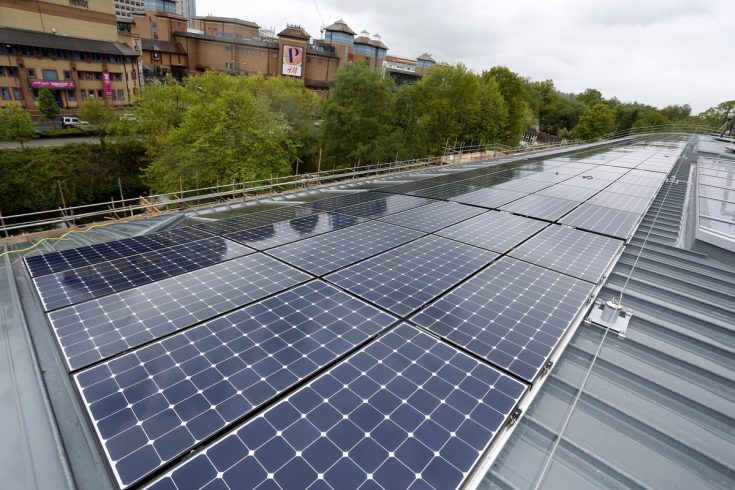Four obstacles blocking clean, efficient energy
Posted on April, 27 2020
Energy efficiency and solar power are potent climate solutions - but they can only be unleashed if key barriers are removed.
Every year, governments gather to negotiate how to work together to limit the impacts of the climate crisis. But the solutions discussed in these conferences do not always seem to translate to practical applications. Years after energy efficient technologies and renewable solutions have been brought to market, many cities, businesses and homes still remain devoid of them.Improvements to energy efficiency (particularly for cooling) and the rapid adoption of solar on buildings are essential components to tackle the climate crisis. They are also economically attractive. Solar PV module prices alone have fallen by around 80% since the end of 2009. Solar energy is now the cheapest form of energy in many countries, including Chile, Egypt, South Africa, India and France. But too many countries and their major cities are failing to enable their uptake.
At WWF, we have installed solar at 41 of our offices, from Myanmar to Paraguay to Switzerland to Madagascar. In doing so, we have faced obstacles across the world that impede the rapid development of solar energy and efficient cooling. Here are a few of them:
Regulatory barriers
For solar PV, the most common barrier is the lack of so-called ‘grid-injection” rules. In many countries, owners of renewable energy systems are compensated when they produce more electricity than they consume and supply the local grid with the extra power. These payments can have a big impact on the economics of solar panels.
However, other countries still lack such grid injection rules and payments. In fact, some countries actively forbid grid injection for small-scale systems. This could be because grid operators are afraid that the solar installations will disturb grid management or because local utilities hold monopolies and see potential competition from distributed renewable energy as a threat. Some countries allow for grid injection, but make it an administrative nightmare.
Given the chronic shortages of power or grid overload in many developing countries, such opposition does not serve the interests of consumers and acts as a brake on economic growth. We’ve encountered such problems in Peru, Bolivia, Paraguay, Ecuador, Madagascar, Bhutan, Myanmar, Cameroon, the Democratic Republic of the Congo, Colombia, Central African Republic and others.

Artificially low power prices
Many countries continue to subsidise electricity. For example, for many years, domestic power prices in Vietnam were below generation and transmission costs. They have recently increased to US$0.08/kWh to enable the power sector to break even. In Paraguay, the price is only half of that. This compares with prices in other countries that can go up to US$0.20/kWh of even more.
Transparent electricity prices that reflect production, transmission and distribution costs are crucial for solar energy to compete fairly. Subsidised prices also undermine the incentive to use electricity more sparingly or to invest in more energy efficient appliances. This is cruelly felt for cooling appliances such as air conditioners, where efficient devices can consume 50% of the electricity needed for inefficient devices.
Subsidised energy tends to be politically popular. However, the benefits typically accrue not to the most needy communities, but rather to the middle and high classes running air conditioners, refrigerators, swimming pool pumps and lighting large houses, so receiving a larger share of the subsidy. An alternative is progressive electricity pricing, where the first 100 kWh per month, say, is supplied at low cost, with additional consumption charged at a higher rate. This would unleash the market for solar and efficient products, without need for subsidies.
Limited local capacity
Many developing countries may have few local installers with limited experience in installing solar PV. With a lack of experience, installations may not run smoothly, and equipment may not work properly.
Tiny local markets can mean that local suppliers may be selling equipment that was bulk-bought several years ago (because buying a container full of solar equipment makes more sense than importing a small number of kits). This means that the dramatic reductions seen in solar module prices in recent years might not yet be reflected in local prices.
Pilot projects, funded by international donors, can be highly effective in soaking up legacy equipment, bringing in more contemporary technology and, crucially, building up local expertise in installation and maintenance.

A lack of knowledge among consumers and policymakers
All too often, there is limited understanding of what opportunities exist from energy efficiency, or what solar or other renewables can offer. In too many countries, for example, solar is considered to be an off-grid technology, of use only to poor, isolated rural communities. People tend to perceive efficient appliances as more expensive: if you look at the price tag in the shop, that unfortunately tends to be true.
But if you factor in operations and maintenance throughout the lifetime of the appliance, energy efficient devices are by far the cheapest option. Getting that point across in a clear and understandable manner is not always an easy task.
In our experience with WWF offices, showing what energy efficiency and renewable energy can deliver triggers enormous enthusiasm. It is empowering to staff and provides an example of best practice to local businesses, administrations and householders.
Policymakers, too, can be quick to embrace clean energy technologies when they are educated about its prospects: in Madagascar, for example, our office solar panel installation led to work with local policymakers to craft legislation to enable renewable energy net-metering.
Our message is that small changes – to regulation, domestic capacity and local knowledge – can have big impacts on the speed at which countries take climate action. Governments, donors and multinational companies all have a role to play in ensuring that commitments made on the international stage result in real change back home.
Jean-Philippe Denruyter is the manager of applied energy solutions at WWF, based in Brussels, Belgium.

